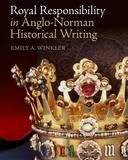Dr Emily A. Winkler
I completed a research fellowship as Principal Investigator of an Arts and Humanities Research Council project, entitled ‘The Search for Parity: Rulers, Relationships and the Remote Past, c. 1100–1300’ (2019–2022). My Co-Investigator Dr Nia Wyn Jones (formerly of Bangor University) and I are currently completing the manuscript of our co-authored book, Historical Thinking and the Roman Past: The Case of Medieval Wales and England.
Research Interests
I am a historian of culture and society in the central Middle Ages. I work on historical thinking, emotional history, and colonial experience in the high Middle Ages, with interests in the British Isles, the Anglo-Norman world, and the North Sea zone. I have also published on the social and material culture of the Norman Mediterranean world, especially Sicily and southern Italy. In my research, I apply cross-disciplinary and comparative approaches to the past to understand medieval people and ideas. Several core questions are at the heart of my work. How did historians writing in the Middle Ages think about the past? How do art, architecture and archaeological remains tell stories about the thoughts and values of the people who created and interacted with them? What insights does the study of writing and rewriting history in the Middle Ages offer into diplomacy and conquest, both in practice and in perception? How can phenomenology—the study and philosophy of lived experience—and recent research on emotions in history help us to retrieve medieval ideas about human thought and feeling?
In addition to my monograph Royal Responsibility in Anglo-Norman Historical Writing, I have co-edited four books: Rewriting History in the Central Middle Ages (Turnhout, 2022), The Normans in the Mediterranean (Turnhout, 2021), Designing Norman Sicily: Material Culture and Society (Woodbridge, 2020), which is an interdisciplinary study of art, architecture, archaeology in high medieval Sicily, and a book about a twelfth-century chronicler and ‘Renaissance man’, Discovering William of Malmesbury (2017). Most recently, I have published articles and chapters on the history of grief and loss, on re-thinking gender history and rulership, and on how medieval ideas about borders revealed challenges to the stereotypes of the day. For full details, please see the Symplectic publications page.
Previously, I held an Alexander von Humboldt Research Fellowship at the University of Mainz in Germany (2017–2019) and the John Cowdrey Junior Research Fellowship in History at St Edmund Hall, Oxford (2015–2018).
I am the Acquisitions Editor in History at Medieval Institute Publications (University of Western Michigan, Kalamazoo / De Gruyter, Berlin), and I serve as Vice President for Europe of the Haskins Society.
Graduate Supervision
I welcome enquiries about supervision in History or Medieval Studies from prospective masters and doctoral students. I supervise dissertations for the MSt in Medieval History and the interdisciplinary MSt in Medieval Studies, and have run the Doctoral Training Seminar for first-year doctoral students in Medieval, Byzantine, and Late Antique History at Oxford. My current doctoral students are Carlo Maria Zanetti (University of Oxford) and Joshua Coulthard (Edge Hill University); my current masters student is Lauren Pidgeon (Oxford). Past masters students include: Harriet Strahl (Oxford, 2022), Nia Moseley-Roberts (Oxford, 2022), Dr Giles Connolly (UCL, 2017), and Dr Liam Fitzgerald (UCL, 2017).
More information can be found at:
Featured Publication
In the Media
‘Was there history in the Middle Ages?’
Find out from Dr Winkler’s ‘Teddy Talk’, given at St Edmund Hall’s Research Expo in February 2017
Available as a University podcast and YouTube video.
https://www.youtube.com/embed/vymrPPwCsxE?controls=0





